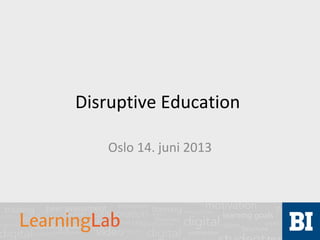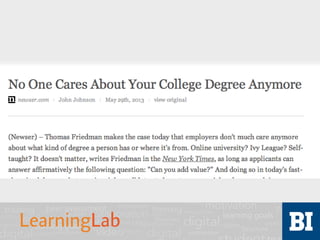Eden conference 14.06.2013
- 1. Disruptive Education Oslo 14. juni 2013
- 2. How do we percieve education?
- 3. What does it mean to disrupt?
- 5. Paradigm of education • Learning is hard work – takes disipline • Learning is not fun and play • Learning happens at school from 9 to 5 • Learning happens in 190 of the 365 days of the year • Homework enhances learning • The teacher is the single most important factor for learning
- 6. Cont. • Learning must be controlled and structured • You need a curriculum and readinglist • You need quality controlled learningmaterial, preferably in the form of a book • Classes • Schoolbuildings • The teacher is the one who knows it all • Separation of practical and theoretical subjects
- 7. Cont. • The exam proves that learning has occured
- 8. Nøttelitenskolen One size fits all •One teacher •One class •One subject •One lesson •Sit-in, synchronous •Curriculum •Book •Testing
- 17. So what is the disruption? • Personal • Never ending • Collaborative • Unexpected • Productive • Social
- 18. Thank you for the attention. • Twitter: junebre • Blog: junebre.blogspot.com • Email: junemrb@hotmail.com
Editor's Notes
- Hvor finnes kunnskapen: vis bok vs mob – hvem er mest oppdatert


















